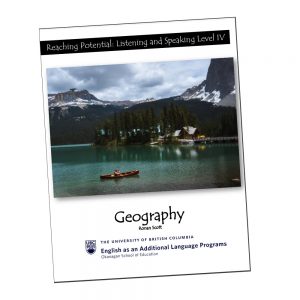 Ronan Scott, an English Language Instructor at Okanagan College, left Dr. Scott Douglas’s, associate professor in the Okanagan School of Education, language book presentation feeling inspired to pursue his Master of Arts in Education.
Ronan Scott, an English Language Instructor at Okanagan College, left Dr. Scott Douglas’s, associate professor in the Okanagan School of Education, language book presentation feeling inspired to pursue his Master of Arts in Education.
“I’ve always been interested in the creation of language learning materials and I was excited to finally meet an author,” says Scott. “Following the presentation, I was speaking to Dr. Douglas and as we went further into conversation, I realized if I wanted to create effective language learning materials, I needed to know more about languages and how people learn.”
***
After four years of studying at the University of Ireland, Galway Ireland, Scott received his Bachelor of Education with teachables in religion and history.
“My first teaching position was at a high school in Norway, and I realized I didn’t want to teach religion and history, and I didn’t enjoy teaching children as much as I enjoyed teaching adults.”
Scott decided to pursue a Cambridge Certificate in Teaching English to Speakers of Other Languages (CELTA) in Prague, Cz. After obtaining CELTA, he spent 18 months travelling and working around Europe at various language schools before eventually deciding to move to Canada.
“I started working at a private language school in Toronto, and my partner and I found the city wasn’t for us. When you picture Canada, you picture the Rockies. We heard about Kelowna and decided to pack up and move.”
Three years and one presentation later, he began the School’s Master of Arts in Education program and immersed himself in the language learning field. With Dr. Douglas as his supervisor, they focused on education and languages together. Not only looking into how people learn language, but how can people learn languages using materials.
“As a language instructor, you will pick up a book and have to make a decision whether to use it or not,” says Scott. “And when you go through it how do you decide if it’s effective? How do you examine it with a critical eye? That is what I wanted to figure out.”
To develop the theoretical framework for his thesis, he researched second language acquisition and general education theories, and material development principles.
Based on this research, Scott developed a set of ten principles for language learning materials:
- The language learning material or activity is as authentic as possible.
- The language-learning material or activity actively reduces classroom anxiety.
- The language-learning materials use language which is thought to be in the +1 area of the students’ additional language.
- The language-learning material or activity helps students become valued members of the community.
- The language-learning material or activity promotes controlled and free production of communicative speech.
- The language-learning material or activity provides a rich recycled exposure to the target language.
- The language-learning material fosters critical thinking, empowerment, and motivation.
- The language-learning material utilizes engaging and relevant content and objectives.
- The assessments in the language-learning materials provide several options for competition and are relevant to the context of the situation and content of materials.
- The language-learning materials are based on the relevant curriculum or guidelines adopted for whom the materials will be used.
Source: The perceived benefits of using English as an additional language learning materials created according to a principled framework (2021)
Scott believes that if an instructor follows these principles it will guide them in creating, choosing or editing their own language learning materials.
“I really want this research to be the start of a very focused conversation about effective language learning materials, and I want it to motivate other people to create their own principles of material development.”
Not only was Scott writing a thesis on the topic, he was working with members of the School of Education’s EAL department to develop Open Education Resource (OER) materials. The materials were created based on Scott’s principles and covered three topics: business, geography and technology.
All of the materials are based on the BC articulation guide for English as an additional language schools. This guide covers what goals that must be achieved in order to help prepare students for post-secondary education in Canada.
“The goals are focused on what skills do students need in order to thrive,” says Scott. “For example, they need to be able to take notes, be able to paraphrase, express themselves, and agree and disagree in a respectful manner. You pick all these goals you want and then you start thinking how do you move your student from here to here.”
The idea is that a student will be able to come into the classroom, use the materials and by the end of those materials they should be able to accomplish those goals.
For Scott, this project meant occasionally reminding himself that he wasn’t creating lessons. He was creating materials for people he’s never met and will likely never meet. He needed to ensure that someone would be able to pick up these materials and know exactly what to do.
“Dr. Douglas said that it takes about 100 hours to create one hour of classroom materials, and after this project I have a much greater appreciation for those materials,” says Scott. “I would love for people to use them and let us know what they think, and also to be inspired to create their own language learning materials.”